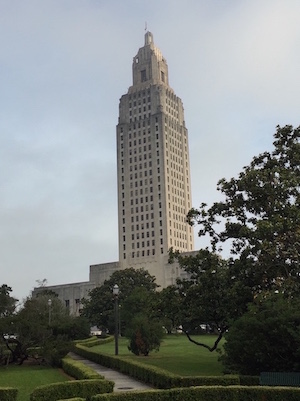Jim Beam column:State’s voters staying home
Published 7:02 am Saturday, December 9, 2023

- Many of the Louisiana legislators who will convene Jan. 8, 2024, for new four-year terms were unopposed, which indicates many voters are tuning out politics.
Southwest Louisiana has four senators and nine representatives in the state Legislature and three of the senators and six of the nine House members were unopposed for re-election. Statewide, 15 of 39 senators were unopposed and 47 House members had no opposition.
The high number of unopposed candidates combined with extremely low voter turnouts is a clear indication that many Louisiana voters have tuned out politics. Continuing controversy in Washington, D.C., is also part of the problem.
Area state senators who were unopposed are Republicans Heather Cloud of Turkey Creek, Jeremy Stine of Lake Charles, and Mike Reese of Leesville. Cloud represents all of Allen Parish.
Representatives who were unopposed are Republicans Dewith Carrier of Oberlin, Les Farnum of Sulphur, Brett Geymann of Moss Bluff, Phillip E. Tarver of Lake Charles, Troy Romero of Iowa, and Ryan Bourriaque of Grand Lake.
GOP Sen. Mark Abraham of Lake Charles had one opponent in the Oct. 14 primary. Abraham defeated Democrat Joshua “Josh” Lewis of Lake Charles, picking up 81% of the vote to 19% for Lewis.
Republican Rodney Schamerhorn of Leesville defeated Clarence Beebe, R-Hornbeck, picking up 60% of the vote to 40% for Beebe. Charles A. Owen, R-Leesville, defeated Independent William “BJ” Jones of Leesville, picking up 85% of the vote to 15% for Jones.
Rep. Wilford Carter of Lake Charles, the only Democrat among the area’s 13 legislators, defeated Democrats Kevin D. Guidry and Franklin D. Lewis Sr.. Carter polled 62% of the vote to 30% for Guidry and 8% for Lewis.
The Advocate in a report about this year’s statewide elections said Republican Gov.-elect Jeff Landry’s 52% of the vote in the primary that gave him the election was something no other first-time candidate has done since the inception of the current version of the state constitution in 1974.
Republicans next year will also hold all seven statewide elected offices for the first time since the second term of then-Gov. Bobby Jindal, Democratic Gov. John Bel Edwards’ predecessor.
The GOP had already achieved a two-thirds majority in both the state House and Senate, but it increased its numbers in the recent elections. The House will have 73 Republicans and 32 Democrats. The Senate will have 28 Republicans and 11 Democrats. A two-thirds majority is 70 votes in the 105-member House and 26 in the 39-member Senate.
Rep. Randal Gaines, a Democrat from LaPlace, is term-limited and will be leaving office Jan. 8. Gaines told The Advocate what it takes to win elections.
“The first thing we need to do is impress upon our constituents the vital importance of the need to vote,” Gaines said. “It’s not enough to talk about our patriotic duty. People have real needs. Unless we can convince them of how their voting for a particular candidate will impact their lives and homes, we will not be able to motivate our voters.”
Pearson Cross, a political scientist who runs the School of Behavioral and Social Sciences at the University of Louisiana-Monroe, told The Louisiana Weekly newspaper why the Republican Party played a lead role in Landry’s gubernatorial victory.
Cross said Landry’s early endorsement by the party over other GOP candidates in 2022 may have had an impact. He said the party can help candidates raise and spend campaign funding more efficiently.
“Jeff Landry has been marching to the coronation ever since the state GOP endorsed him early,” Cross said. “People felt no reason to go to the polls this time around.”
Joshua Stockley, a political science professor at ULM, told the same newspaper, “This is the most apathy and least-interested electorate I’ve ever seen.”
Louisiana’s statewide election cycle generated almost record-setting low voter participation. The newspaper said turnout for the 15 previous gubernatorial primary and runoff elections held since 1979 hovered around 1.4 million people on average. However, just 1.06 million people out of nearly 3 million registered voters cast ballots in the race that Landry won.
Fortunately for Gov.-elect Landry, his supporters were an exception to the trend. They made it to the polls.
The next major political party elections come on March 23, 2024, when Democratic and Republican state central committees will elect their members. It is the same date for the presidential preference primaries for the state Democratic, Republican, and Independent parties.
Interest in those party elections has never been high in the past and it will be interesting to see if that trend continues.




